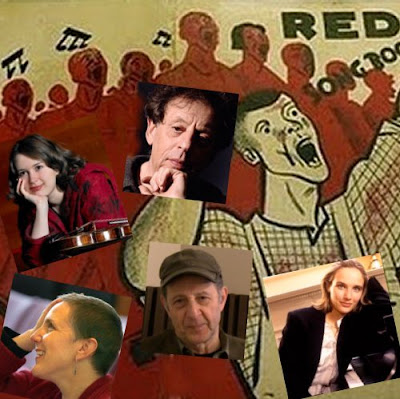Classical music is trying to teach monkeys to meditate
This photo* shows the Joffrey Ballet production of the The Rite of Spring which reconstructs the 1913 Paris premiere of the ballet using Nijinsky's choreography and Nicholas Roerich's designs. That Paris premiere was a tipping point not only for classical music and ballet, but also for contemporary art itself. The 1987 video of the Joffrey Ballet, or that of any other faithful production of the Rite, literally drives home the ecstatic quality of both the music and the choreography. It is also striking that this ecstasy has more in common with today's electronic dance music (EDM) than to the church-like ambience of the classical concert hall - see this video of a set by leading EDM exponent Armin Van Buuren to understand the similarity.
Doubtless classical music's great and good will be wishing for a big, new and young audience as 2018 morphs into 2019. But many of that young mass market target audience were right there at that Armin Van Buuren gig and at countless other electronic trance celebrations around the globe. Is it realistic to expect this audience to respect the etiquette of the museums of sound that are today's classical concert halls? Digital technologies and mobile computing have, whether we like it or not, turned all of us into technology-driven monkeys. Attention spans are diminishing, multi-tasking is the norm, and mobile listening has become the dominant way of consuming music. So by trying to woo this monkey-mind generation into the concert hall, isn't classical music attempting the impossible task of teaching monkeys to meditate?
My 70th birthday approaches. Over the years I have often written here in defence of classical music's many performance conventions, and in seven decades I have been to more classical concerts than many people have had hot dinners. But when I look back over 2018 I find I have spent much less time in the concert hall, and far more time listening to classical and other art music in peripatetic mode. And as I look back over 2018 I can see no real evidence of concert performances gaining traction with a young, mass market audience. But what I do see is the further dilution of the traditional concert hall experience by ineffectual gimmicks, a dilution which not only fails to attract a new audience, but which is also driving away core audience members such as myself.
In a 2014 interview with me the visionary Jonathan Harvey explained that "Young people today, the mass of young people, don’t like concert halls... They wouldn’t normally go to one, except for amplified music". Jonathan went on to suggest the new young audience should be able to "come and go". In four short years technology change has widened the definition of 'coming and going' from moving around the concert hall to listening wherever your lifestyle takes you. 2019 is the year in which classical music needs to wake up and smell the coffee. You cannot teach monkeys to meditate, and you cannot force millennials to sit still and silent for two hours. There is a place for museums of sound, just as there is a place for museums of antiquities. But years ago the rock music industry woke up and realised that technology has changed the ground rules. This change means rock's major revenue opportunity is now downloaded/streamed music, and live gigs are no more than a vehicle for promoting digitised music sales.
This is a hard scenario for classical to accept because it fundamentally undermines a business model based on celebrity musicians earning massive fees for traditional classical concerts. But if it really wants to survive and grow, classical music must accept that the arm's length consumption of music via predominantly mobile platforms - either recorded or streamed in real time - is now the listening mode of choice for audiences in general and for that elusive young audience in particular. One conclusion from this scenario is that we - and this includes London - have more than enough excellent concert halls. The diminishing importance of 'stadium classical' means fiscal expectations of the top tier of musicians and their agents must change. Another conclusion is that there is far more to leveraging digital technology that an obsession with social media approval, and that classical music's biggest challenge is bridging the very real current technology gap without throwing the artistic baby out with the binary bath water.
* Photo credit Herbert Migdoll. New Overgrown Path posts are available via RSS/email by entering your email address in the right-hand sidebar. Any copyrighted material is included for critical analysis, and will be removed at the request of copyright owner(s).










Comments
For all their faults, NL’s books shone an important light on that issue